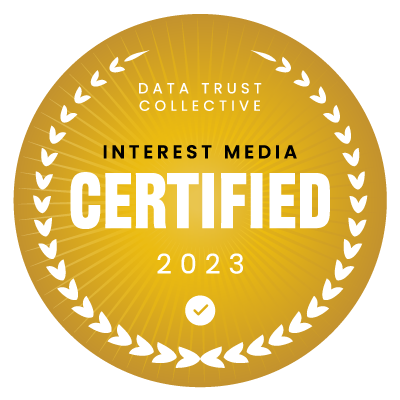
How Co-Registration Can Optimize Your Lead Generation and Cut Costs
- Lead generation through co-registration can help you expand your customer acquisitions using precise data directly given by the individual.
- Co-registration can significantly increase your lead generation while lowering costs and optimizing your marketing budget.
- Interest Media is an owner-operator of a variety of host & post and co-registration offers utilizing first-party and self-declared data for precise targeting.
The Power of Co-Registration for Your Lead Generation
“The US digital lead generation market will reach approximately $3.2 billion by 2023” – SalesMate
Co-registration lead generation, also called co-reg, is an effective way of capturing more leads and generating increased revenue. It’s a win-win, giving the consumer more relevant offers and generating more leads for the advertiser and publisher.
The benefits of co-registration
Co-registration can do many things for your business. It can present you with more potential clients and build your email address. The data insights can help you deliver more targeted offers based on the responses. It is an ideal way to generate qualified leads that are interested in your product or service. The conversion rates of co-registration leads are extremely high.
What is the cost of co-registration?
With co-registration, typically, leads are negotiated on a cost-per-lead basis. For performance-based marketing, this type of pricing model makes these leads efficiently priced.
Pricing will depend on numerous factors including the offer, targeting, brand, and fields collected.
For example, acquisition for an email subscriber can cost between $0.25 to $0.50 on average, according to one estimate. In comparison to acquisition costs on Google or Facebook, you can see this is not only quite a savings but far less than the average click.
How Co-Registration Works
You may have already co-registered for offers herself. For example, if you’ve ever signed up for a newsletter, you may have seen a checkbox giving the publisher permission to send you related offers from other advertisers. That’s co-registration.
Typically, a prospect on a company’s website or at what’s called a “host & post” site that to the offer provider. When the consumer opts in for the related offers, the lead is generated for both businesses.
It typically follows these steps: (1) The prospect arrives on a website. (2) the prospect registers on the site. (3) The prospect is shown the co-reg page with the additional offers.
4 reasons you should consider co-registration
“53% of marketers spend approximately 50% of their budget generating leads” – RulerAnalytics
Here are four reasons you should consider allocating part of your overall marketing budget to co-registration for lead generation.
1. Low cost, inexpensive to try
The cost outlay to experiment with co-registration lead generation can be as low as $0.25 per lead. On a test budget of $2,500, you can generate 10,000 leads.
2. Co-registration leads are of higher quality.
Because these are targeted and exclusively captured to be associated with your brand, they are not generic.
3. Easy to implement
Co-registration leads are generated on “host & post” websites maintained by the provider (owner-operator). Providers usually will work with you to get the entire process implemented (backend, connecting to email services provider or call center facilities). They will also make sure your offers are compliant with legal requirements.
4. Scalable
Everything associated with a co-registration offer can be tracked and measured. If the process works for you, it’s easy to scale. You can also scale over time, growing your volume at a rate that stays within your budget and cost-per-acquisition goals.
How Interest Media Can Help You with Co-Registration Offers and Lead Generation
Interest Media owns and operates several properties that can help publishers with co-registration offers and other forms of lead generation. Among the properties are “The American Sweepstakes,” Free Samples Pro USA,” “Top Survey Spot,” and “Prime Reward Spot.”
Among the available traffic types are co-registration, host & post, offerwalls, linkouts, and warm transfer calls. Offer categories such as insurance, debt, home services, mass torts, and more are available.
In all of its advertising efforts, Interest Media puts its primary focus on the consumer. Interest Media understands that the most important component of a successful advertising campaign is the positive experience of the consumer.
Why choose co-registration offers with Interest Media?
“One of the biggest benefits is cost,” says Wendy Lee, Senior Director of Advertiser Development at Interest Media. “Secondly, is the targeted approach using self-declared data.”
“Co-reg is typically a lot more cost-effective,” Lee adds.
“So, if marketers can blend these leads with other more expensive leads, it’s a great way to optimize their overall spend.”
Increase leads and cut costs with our complete omnichannel solution
Interest Media’s network boasts over 100 million fully registered consumers. We’ve been an industry leader in providing data-driven results. Our first-party data has been acquired with absolute precision. We combine our data with real-time optimization that provides a positive user experience. We can help you drive higher earnings. Our publishing partners earn more for their inventory than anyone else in the industry today.
Send our team a message to start the conversation:
Co-Registration and Power of Self-Declared Data
The most powerful data you can use in marketing is self-declared data. It goes by other terms such as declared data or zero-data.
Declared data is a type of first-party data. This means the data is generated from a direct interaction between a consumer and a brand. It differs from other data in that it is not accessed or purchased from a third party.
But what really separates self-declared data is the information is voluntarily provided by individuals about themselves. In other words, it is information explicitly volunteered by a consumer. This data may include interests, preferences, behaviors, and demographics such as age, gender, location, etc.
This is in contrast to third-party data that has to be accessed from other sources.
Collecting “soft” attributes from self-declared data
Another powerful feature of declared data is that it can also glean “soft attributes from the information such as intentions, motivations, interests, aspirations, and preferences. Marketers are able to use these soft attributes to make informed conclusions without explicitly asking the customer about these things.
Self-declared data is the key to personalization
“Personalization during lead nurturing enhances the potential of conversion by 63%,” – BrightTalk
Customers are demanding more personalized experiences online and in-app. Younger consumers not only expect personalization, they practically demand it.
That’s where self-declared data comes in. It is the key ingredient to personalization. Declared data is information straight from the consumer. Self-reporting is much more accurate in terms of obtaining precise information in understanding a consumer’s needs, wants, and motivations.
Inferred data & third-party data
Inferred data can be provided directly or indirectly from a person. The data is largely the result of processing. It is also developed without the express input of the consumer. It is the product of behaviors, search histories, content consumption, social media activity, purchases, and more.
Inferred data can also be the product of human and/or machine analysis and used to make predictions about a consumer and their intent. Marketers use this data to predict future behavior based on past actions.
Unfortunately, third-party data and inferred data fall short of what’s necessary to fulfill the promise of fully personalized messaging. Trying to determine intent from third-party and inferred data is more guesswork than hard facts.
The difference between first-party data and self-declared data
On the surface, first-party data and self-declared data may appear to be the same thing. But there is a crucial difference, and that is in how the data is obtained.
How first-party data is collected
First-party data can be collected in numerous ways including from a company’s website, app, other digital properties, and offline interactions with customers.
How self-declared data is collected
Self-declared data is typically collected through engaging customer experiences. These include: Online surveys, questionnaires, forms, and other methods of data capture.
When marketers need to make assumptions or draw conclusions, self-declared data is typically more accurate. The personalized experiences of collecting self-declared data can lend itself to a better understanding of a customer’s intentions, motivations, and needs. This allows marketers to tailor their marketing messages more effectively and improve personalization.
Capturing self-declared data and co-registration
One of the challenges of capturing younger consumers is providing engaging interactive and/or value-driven experiences. However, the brands and companies that can meet these expectations can attract consumers aged 18-34 and motivate them to provide self-declared data.
Co-registration and self-declared data
For a short definition of co-registration, it’s the practice of allowing a consumer to opt in for multiple offers by registering for one primary offer.
Typically, the consumer will be offered a checkbox that allows them to sign up for a related offer. This is the opt-in for co-registration. When the consumer checks the box, their data will be transferred to both advertisers that are presented on the form.
Consent-based marketing
From a legal standpoint, the consumer must explicitly opt-in for the co-registration to ensure they want to be contacted with other offers. This is known as consent-based marketing, in which the consumer gives prior consent to be contacted. This provides legal compliance for the marketer. It also qualifies and enhances the lead data.
Interest Media can help with co-registration and consent-based marketing, ensuring that your campaigns will be compliant with applicable laws. Reach out to our team to start the conversation!














